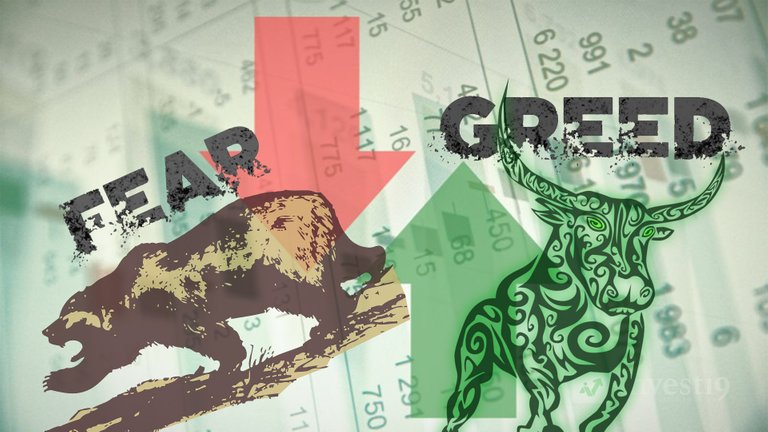Managing Fear and Greed in Investment Decisions
INTRODUCTION
Giving into fear and greed can significantly cause negative impacts to investor's portfolios, the market's stability, and even the overall economy. While the old maxim that the markets are driven by two emotions, fear and greed, may be an oversimplification, it often presents itself.
By letting fear and greed enter into the governance of the investment decision making process, investors are more than likely influenced by irrational decision making processing that can lead to disaster. It is the purpose of this article to bring an understanding of the market psychology of fear and greed to the forefront so as to avoid their potentially disastrous effects on investments.
EXAMINING GREED IN THE INVESTMENT DECISION MAKING PROCESSES
Contrary to what fictional investor Gordon Gekko advanced in the movie Wall Street, not all 'greed is good'. When investing, it is the mentality of most that they should 'get rich quick', and this sentiment is exacerbated in times of bull market runs.
A brief look into financial history demonstrates this by looking at the dotcom boom of the late 1990's. Any investment with a dotcom appended was highly sought after and investors leaped at the chance to gobble up these assets. The accumulation of internet assets was unprecedented and fundamentals mattered not. Many of the investments offered were barely start-up companies or mere shells with no substance.
But as investor's greed took over and the accumulation reached fever pitch, more buying and upward price bidding fueled prices to excessive levels. Then, as with most asset bubbles, the bubble burst and stock prices plunged to depressed levels from 2000 through 2002. [See, e.g. Alden, C. Looking back on the crash. (Accessed November 10, 2021)].
It is precisely this 'get rich' mentality that lies at the heart of what former Federal Reserve Chair Alan Greenspan called 'irrational exuberance'. On this topic, Greenspan said:
History demonstrates that participants in financial markets are susceptible to waves of optimism, which can in turn foster a general process of asset-price inflation that can feed through into markets for goods and services. Excessive optimism sows the seeds of its own reversal in the form of imbalances that tend to grow over time. When unwarranted expectations ultimately are not realized, the unwinding of these financial excesses can act to amplify a downturn in economic activity, much as they can amplify the upswing. As you know, last December I put the question this way: "...how do we know when irrational exuberance has unduly escalated asset values, which then become subject to unexpected and prolonged contractions ...?
[The Federal Reserve Board. Testimony of Chairman Alan Greenspan. (Accessed November 10, 2021)].
Especially in times of a bull run, we, as investors, must self realize when we are letting greed rule and command our investment decision making processes. During these times it becomes essential to stick to basic fundamental investment strategies. Maintaining a long term investment horizon, dollar cost averaging, and being able to avoid herd behavior should take precedence over greed in our investment decisions.
EXAMINING FEAR IN THE INVESTMENT DECISION MAKING PROCESSES
Unless you can watch your stock holding decline by 50% without becoming panic-stricken, you should not be
in the stock market.
[Lountzis, P. Mr. Buffett Quotes on Investing. (Accessed November 11, 2021)].
In much the same way as greed can overrun the markets, so can the emotion of fear. Fear can and does cause irrational investor behaviors and can cause serious negative implications to an investment portfolio. When assets show sustained losses, investors collectively begin to fear additional loss causing selling pressure. Thus fear becomes the self fulfilling prophecy of further price declines.
It is fear that prevails in times of a market bust in the same way greed prevails in a boom. Irrational fear takes over and causes a loss mitigation flight to safer investments. Risk comes off the table and there is a migration to money markets, stablecoins, and other low risk/low return investments.
When investors irrationally sell out of fear because many others are likewise selling is known as herd behavior. A mass exodus from a certain investment demonstrates a deviation from long term investing strategies properly based on fundamentals. While experiencing a large loss in portfolio value may be painful, fear induced irrational selling worsens the situation by causing the investor to miss out on the subsequent recovery. Fleeing the market by following the herd is usually a market exit at precisely the wrong time which is destructive to your portfolio.
THE IMPORTANCE OF FINDING YOUR OWN INVESTMENT LEVEL OF COMFORT
Inherent volatility in the markets is the base cause for the entry of the emotions of fear and greed to drive investment decisions. During periods of market instability is when investors fall prey to fear and greed as the instability has removed them from their comfort zone. This fear and greed causes irrational decision making often leading to costly investment mistakes.
Clearly, many investors are emotional in thinking and reactionary in action. Fear and greed are able to corrupt the human mind coercing investors to cast aside rationality and control motivating negative changes. For this reason it is of utmost importance to avoid following market sentiment that can be fear or greed driven and stick to investment fundamentals.
While you must remain flexible, your mental state must remain rational when facing changes to your investment decisions. Don't let the departure from your comfort zone lead you down the irrational path causing the pain of loss.
It is vital for you to stick to rational decisions and fundamentals all while keeping your emotions in check. Avoiding a blind adherence to market sentiment is critical to maintaining your long term investment strategies and finding success in your investment portfolio.
CONCLUSION
Be Fearful When Others Are Greedy and Greedy When Others Are Fearful.
[Moyer, L. Warren Buffett’s big bank score proves his saying true once again: ‘Be greedy when others are fearful’. (Accessed November 11, 2021)
A contrarian view indeed, but readily applicable in considering the effects of fear and greed. Just always remember, fear and greed are powerful motivators that can lead to financial devastation.
Posted Using LeoFinance Beta


